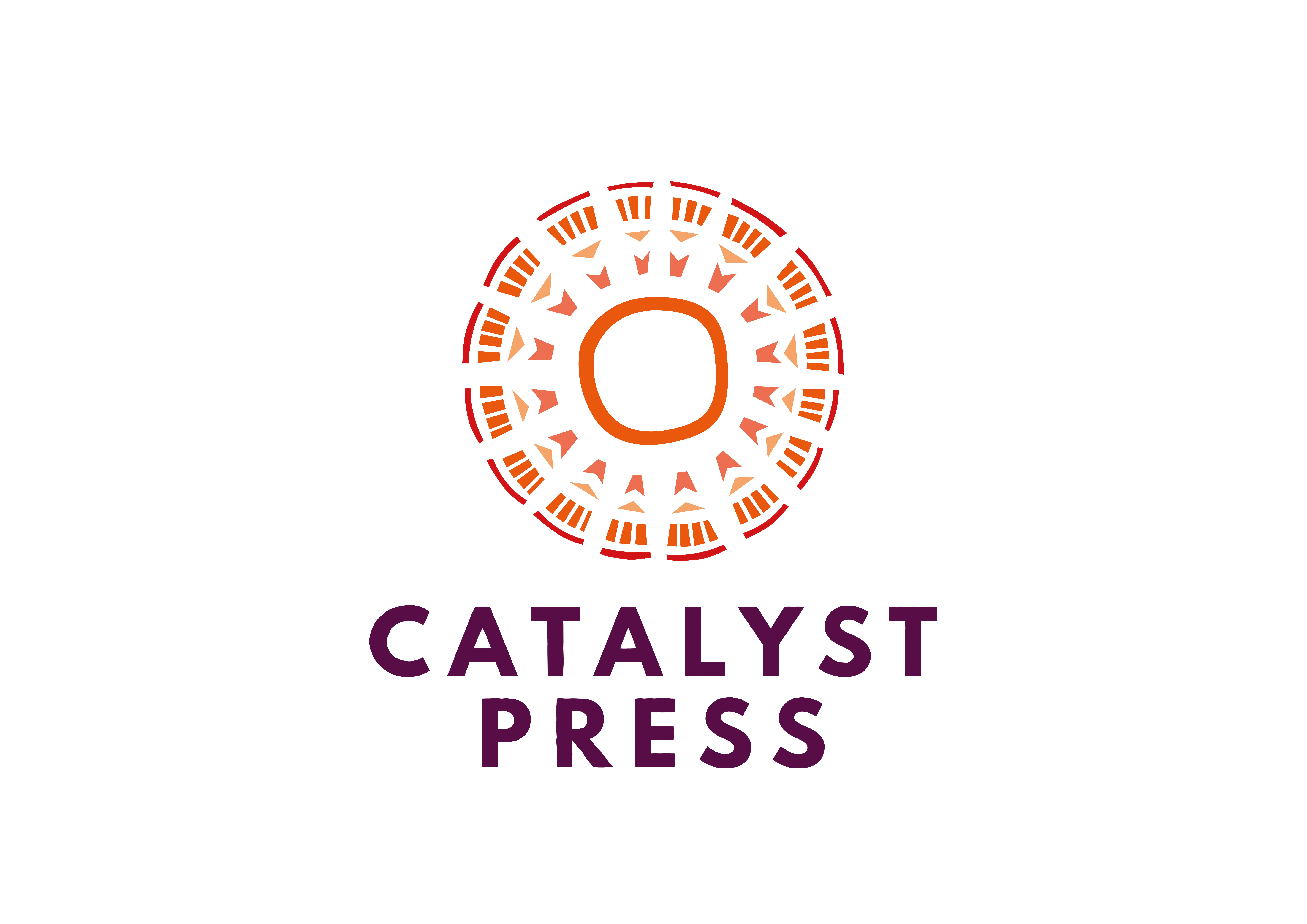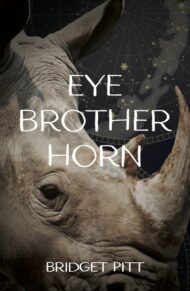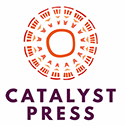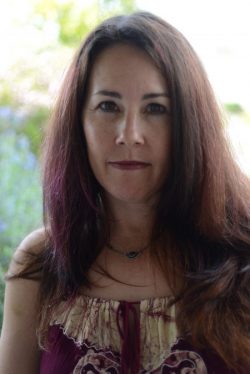Today, I have the honor of chatting with Bridget Pitt, the author of Eye Brother Horn, which we have the privilege of publishing here at Catalyst Press.
An activist, a critically-acclaimed author, and a fascinating conversationalist, Bridget’s newest novel is an evocative look into the history of colonial South Africa as seen through the eyes of two young boys—Daniel, the son of white missionaries, and Moses, a Zulu orphan abandoned on a riverbank—who are raised as brothers on the mission of Umzinyathi in Zululand. I’ll never forget the first time I read this book, and I know you won’t either. To get you started, be sure to visit Literary Hub to read an excerpt from the novel.
In this chat, Bridget and I discuss the meaning of nationality, her literary influences, how she discovers the voices of her characters, and so much more. Let’s get started!
SarahBelle Selig: Hi Bridget, thanks for joining me! I’d love to start with you telling our readers a bit about your writing background. You’ve definitely seen some great success in your early forays into fiction, with your first crime novel being shortlisted for the Commonwealth Writers’ Prize in 2011, and for the 2012 Wole Soyinka Prize for Literature in Africa. But you were also an outspoken environmental and human rights activist in South Africa for many years, and actively spoke out as a journalist against apartheid policies. In what ways is this new story a continuation of that work? How does writing fiction feel different to you, and within fiction, what genres appeal to you?
Bridget Pitt: Eye Brother Horn is my fourth novel, and my first foray into the historical fiction. My first and third books were literary fiction, with the second straddling crime and literary fiction. I realised when writing this book that I was not cut out to be a writer of crime fiction, although I occasionally enjoy reading it. But as a writer I am more compelled by the motivations and the relationships of the characters, and by the unraveling and re-knitting of people’s lives that follow acts of violence, than by how a crime is solved.
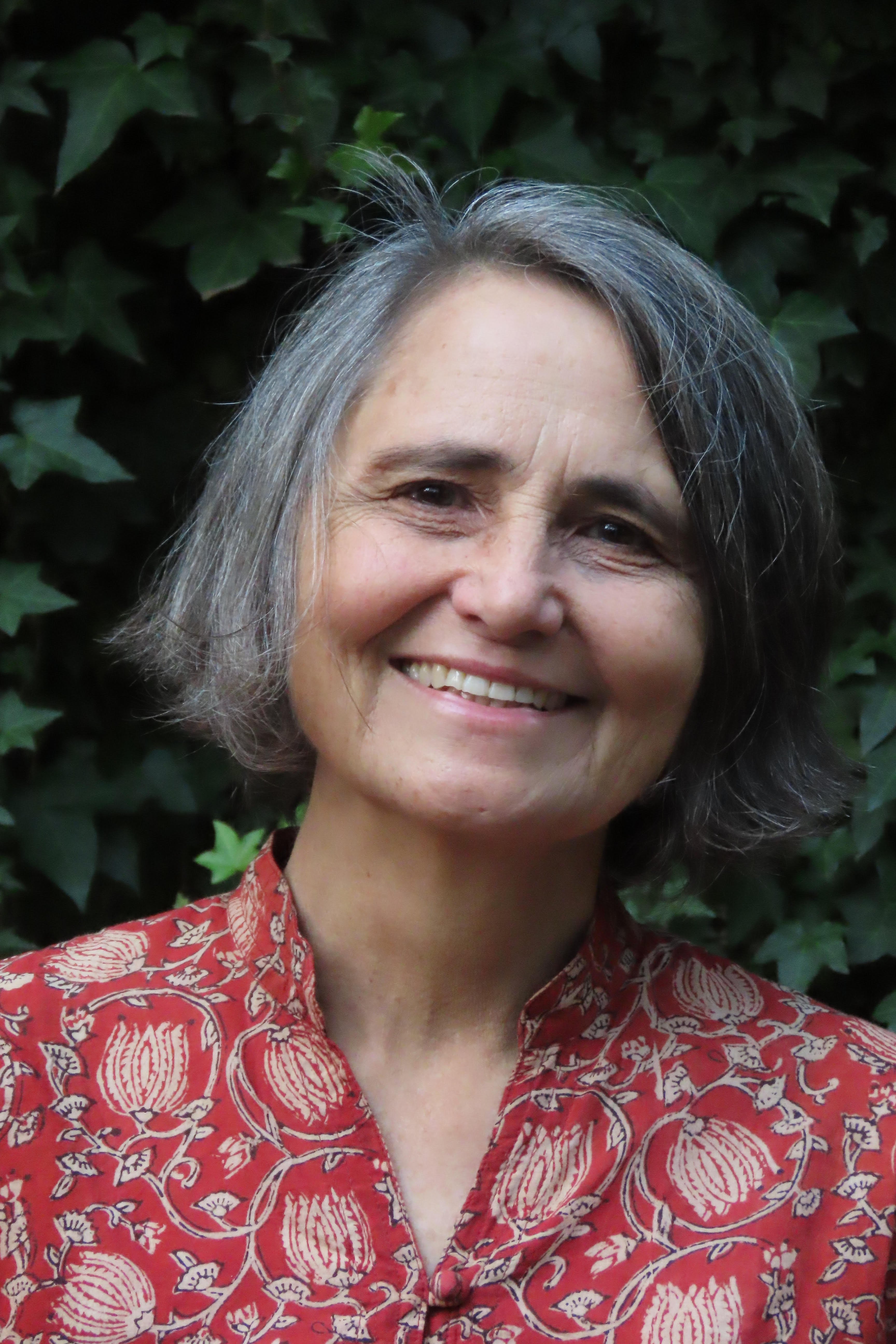
For me the spark of a novel may be a character, a relationship, a story, or just a place … the seed for my third novel was a burnt-out hotel in the Drakensberg mountains. Literary fiction allows for the greatest flexibility in weaving these elements into a narrative.
I have co-authored one non-fiction book, a memoir and spiritual reflection of a wilderness guide and friend, Sicelo Mbatha, and a commissioned book on urban nature conservation. I found it both soothing and constraining working within the boundaries of non-fiction after the lawless expanse of fiction. If the right project popped up I’d be up for writing more non-fiction, but even when working on non-fiction assignments I find myself turning everything into a story.
My own activism has always been strengthened and inspired by fiction written with a critical social lens. Story telling is inherently transformative, and can be a powerful medium for advancing insights, provoking questions, and catalysing change. Writing fiction enables me to explore some of the nuances and complexities of social transitions which cannot easily be conveyed in polemical nonfiction. My writing and activism breathe life into each other, although I am acutely aware of the need to trust the reader to draw their own conclusions, rather than driving social points for home with a sledge hammer.
SS: I know you looked into your own family’s history in the research for Eye Brother Horn. You were born in Zimbabwe, raised in South Africa, but you have European ancestors. What do you consider your nationality? What does nationality mean to you?
BP: The Nigerian philosopher Bayo Akomolafe tells us that the human is not a thing within a territory, the human is a territory. Nationality, in the sense of the country where you hold citizenship, is one of many forces that shape our inner ‘territory’. But it’s a continuously evolving and intangible force, and the compatriots of a country as contested as South Africa doubtlessly hold wildly differing ideas of what their nationality means to them.
Like all humans, I am a territory with an entanglement of many different geographical and cultural reference points. I grew up with my eyes turned north – three grandparents had immigrated from England, one was a third generation South African. I was raised on A. A. Milne, Frances Hodgson Burnett and Mark Twain. I knew about the renaissance, the impressionists, the cubists, I listened to Rachmaninoff and the Rolling Stones. My father fell in love with Italy when he was stationed there in the Second World War, and took me there at the age of 13 to marvel at the wonders of European ‘civilisation’. My maternal grandparents were quintessentially English, offering afternoon tea and scones to be taken while flipping through back copies of the London Illustrated News featuring photos of stocky Royal princelings in tweed jackets (I envied them not because they were royalty but because they seemed to have unlimited access to ponies).
I was not given the benefit of learning an indigenous language other than Afrikaans, although I tried to pick up isiZulu at the lively gatherings hosted by our family housekeeper in our backyard. The little South African “history” I was taught at school was a grandiose and tedious fantasy about God helping the Boers and Brits to defeat unruly local tribes. I knew almost nothing of African art, music, mythology or beliefs.
My older siblings left South Africa for England as soon as they could, but I did not feel the same pull. I felt deeply connected to the South Africa landscape, to the Drakensberg mountains where we hiked every winter, to the highveld grasslands around Johannesburg where I rode horses. I went to university in 1976, and soon became immersed in the anti-apartheid struggle. What drew me was not only a strong belief in the cause, but also for the first time in my life I could interact with my fellow black South Africans as comrades. Of course, there was much complexity in that relationship, and my comrades were quick to disabuse me of any feelings of arrogance or tendency to patronise that came with growing up as a white person in apartheid South Africa. This experience was profoundly transforming, and strengthened both my connections to the place and its people, and my resolve to fight for a more just and equal society. Unfortunately, we are still striving to achieve this. But I never seriously contemplated leaving South Africa after this time.
I left Zimbabwe at the age of two and have no memories of it, although I have visited a few times and found it to be a beautiful country with many creative, resilient and resourceful people, notwithstanding successive dictators. My parents emigrated there in 1950 to escape the newly elected National Party and its racist agenda but were forced to return 10 years later due to financial difficulties. When I was a child, I would look at the sepia photos of our house in what was then Salisbury, with its chickens and vegetable gardens, and feel that I had been cheated out of an idyllic youth by being born too late. But the connection was more to some imaginary country home than to the actual place.

So I guess the territory that is me is woven with threads from of many lands, but if I had to choose a single label it would be South African. [Editor’s Note: Be sure to watch Bridget as part of our #ReadingAfrica Week panel, “Who Is African: Place, Identity, and Belonging in Literature” for longer discussion on this question]
SS: Were your early influences mostly European? How much of what you read now is from African authors and African publishers?
BP: My early literary influences were almost exclusively European and North American. The only African story I remember reading was Jock of the Bushveld [by Sir James Percy FitzPatrick]. As a teenager I was strongly influenced by the social awareness of Charles Dickens, Emil Zola, the French existentialists, Solzhenitsyn, Dostoyevsky… and I loved the grand, epic wisdom and magic of J.R. Tolkien.
I was introduced to African literature when I went to university in Cape Town, and studied works by J.M Coetzee and Andre Brink, Doris Lessing, Nadine Gordimer, Olive Schreiner – who was such a remarkably progressive and independent thinker for a woman of that era. Coetzee taught a course on South Africa literature, which was an optional extra alongside the mainstream Eurocentric courses. One of the first books I read by a black author was Mine Boy by Sol Plaatjie, which left a deep impression, and opened a whole new world for me by revealing my homeland from the perspective of a black mineworker. It also resonated with Zola’s Germinal. After graduating, I continued to explore African writers, made available by publishers like Heinnemann with their African Writers series, and David Philips. Though them, I encountered, learnt from and was inspired by writers such as Wole Soyinka, Chinua Achebe, Alex La Guma, and Ngugi Wa’thiong’o.
I still read a lot of literature emerging from the African continent or the African diaspora. There is so much it is difficult to keep up. Local authors who have inspired me include Zakes Mda, Fred Khumala, Mpush Ntabeni, Marguerite Poland, Damion Galgut, and Andrew Brown; I have been blown away by the rising generation of superb African women writers, such as Tsitsi Dangarembga, NoViolet Bulawayo, Siphiwe Gloria Ndlovu, Petina Gappah, Chimamanda Adichie, Akwaeke Emezi. While the earlier generation of African writers was quite focused on the critical task of retelling colonial and Neocolonial stories from a different perspective, I love how these younger writers are pushing the boundaries of what they write about and how they do it.
I would say about half of the fiction I read is by African writers. Of the non-African writers, some of those who motivate me to keep writing are Margaret Atwood, Ruth Ozeki, David Eggers, David Mitchell, Richard Powers, Louise Erdrich, Hari Kunzru, Arundhati Royi. We are so spoilt for choice as readers, there is no end of extraordinary books.
On the non-fiction side, I’m especially engaged in the works of natural scientists or anthropologists who are exploring new ways of understanding the anthropocene/capitalocene and the interaction of human and more than human lives. Names that spring to mind are Anna Tsing, Donna Haraway and Robin Wall Kimmerer.
SS: Eye Brother Horn is set in the 1870s and 1880s, in Zululand. Why choose this specific time period and place for the book? Do you find that this period in South Africa’s history is neglected in literature?
BP: The colonisation of Natal and Zululand has been well documented, thanks to the European fascination with the AngloZulu war. There have been many books from a British perspective, and some from writers such as Fred Khumalo offering alternative viewpoints. But what has not been written about in as much depth is the impact of colonialism on the wild plant and animal species.
I became captivated by this particular intersection of history, place, human and non-human beings when I started researching a novel about rhino poaching in the area, and realised that this issue could not be understood without understanding history. As I read more, I became intrigued by the way the process of colonisation was so condensed in [the province of] KwaZulu Natal. The colonisation of the Western and Eastern Cape [provinces] unfolded over a few centuries and featured many different players: Khoi, San, amaXhosa, Portuguese, Dutch, British, imported slaves. In Natal and Zululand, it was primarily the British versus a militarised and unified nation in the amaZulu, with smaller but significant roles played by the Boers and nonZulu tribes. The first British came as supplicants, trading on the hospitality of the locals and highly dependent on the good will of the Zulu kings. They quickly learnt to leverage the hostility between the amaZulu and other clans, and in a few short decades, this relationship shifted dramatically. I was interested in trying to capture something of this shift, as well as to reflect on the consequences of colonisation for the non-human indigenous inhabitants.
SS: For much of the book you’re not just writing from the perspective of young children, which is difficult enough—you’re also writing from the perspective of young and teenage boys. How did you find the voices of Daniel and Moses?
BP: I often use art when developing a character – creating collages to express their sense of themselves, imagining how they might draw, what they would choose to draw; I also think about what books they might read… in the case of children, I imagine what games they might play. We have all been children once, and I found it helpful to reawaken how I experienced things as a young child, and also drew on the childhoods of my children. Authors are classic hunter gatherers … sometimes you seek a particular piece of knowledge or insight and hunt it down, other times you come across something precious by accident, and pick it up, knowing that if you don’t use it for this project, you will use it for another. Often those accidentally acquired insights are the ones that really enable you to get under the skin of your characters, to breathe life into them. Once that happens, they become their own agents, and may surprise, delight or alarm me by their choices.

SS: Once you’ve got your characters in mind, what’s your writing process?
BP: I usually start with a fairly clear idea of the beginning and end of a story, much of which unravels as I try to grow the middle. Most of my stories are strongly rooted in a particular landscape; I’m interested in how landscape is incorporated into our sense of self. My actual writing process can be haphazard, although I try to be disciplined in devoting a certain number of hours in a day or week (even if much of the ‘writing time’ is occupied by lying on my back staring at the clouds and wondering why I’m doing this). I have moments of feverish enthusiasm, when it seems that this story simply must be told, and moments of grim despair when I doubt its validity or doubt my capacity to tell it. My insatiable curiosity pushes me radically over-research, and of course the more you discover the more you realise how little you know.
Some of the best advice I read was by Stephen King, who said, ‘write with the door closed.’ Meaning not only literally as in a room by yourself, but also to be beware of oversharing until you have written and checked your first draft. I’ve learnt to be very strategic about who I get to read early drafts and when – but find the feedback I do get hugely helpful. I love the process of editing and rewriting, and do many drafts. Each reworking brings new insights, and I need firm editors to tell me when to stop. The whole thing is a messy, sprawling process with more madness than method and I’m always quite amazed when an actual published novel emerges.
SS: What’s up next for you?
BP: When I set out to write Eye Brother Horn, my idea was to tell a contemporary story parallel to the historical one, but the historical one became too demanding. I still feel the urge to tell the contemporary story set in the same area, touching on issues such as climate change, coal mining, rhino poaching. I am working on a collaborative novel about this with Sicelo Mbatha, who comes from that part of the world. I loved working collaboratively on the memoir – writing a novel can be so lonely. But a collaborative novel is very new for both of us, so we’ll have to see where this leads.
Bridget’s fabulous new novel is available worldwide on January 31st and in South Africa March 1st. You can order your copy here or visit your local bookstore to purchase!
